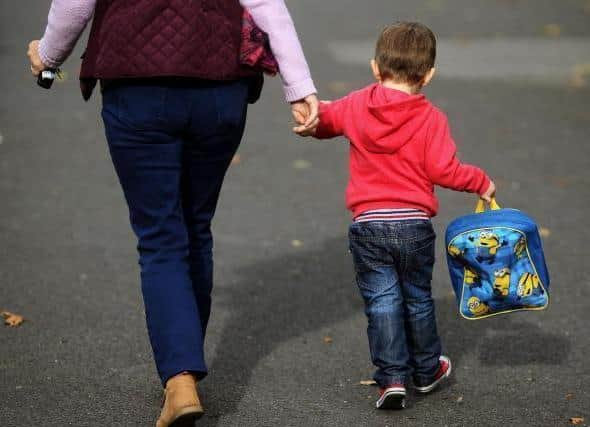Urgent need to provide more support for low income families during pandemic, new Yorkshire-led report says
The findings, from a new national project led by the University of York, say there is an urgent need to provide increased support for low income families with dependent children.
The COVID Realities project, worked with parents and carers living on a low income to share their experiences of life during the crisis.
Advertisement
Hide AdAdvertisement
Hide Ad

Dr Maddy Power, from the department of health sciences, at the University of York, said: "Listening directly to parents and carers on low incomes, it is clear that many people face serious hardship because of the holes and inadequacies in our benefits system, which have been further exposed by the pandemic.
"More needs to be done urgently to help families with children, who have been largely neglected in the policy response.
"But critically, if we are truly to build back better, we need to listen to and engage with the expertise that comes from - and can only come from - lived experience.
"Who is included and who is excluded from policy discussions happening now will have a lasting impact on the world that emerges from the pandemic."
Advertisement
Hide AdAdvertisement
Hide Ad

The research also found there is no ‘new’ normal and the processes of receiving social security support still has stigma and shame attached with it. While structural issues with Universal Credit remain, making it difficult for new claimants.
Findings also showed the £20 Universal Credit uplift has not always, or even often, made a decisive difference to the everyday hardship experienced by families with dependent children living in poverty and more is needed to help families on a low income.
Victoria, a single parent of two children, in receipt of Universal Credit, and a participant in the project said that the £20 Universal Credit uplift had made little difference to her family.
She said: “The cost of everything has gone up - heating, electricity, food, travel and entertainment. Keeping my children's hopes and morale up and reducing the risks of them developing mental health issues, comes with its own costs. Even with the £20 extra, we actually have less money to spend each month than we did before the pandemic.”
Advertisement
Hide AdAdvertisement
Hide AdLead researcher, Dr Ruth Patrick, lecturer in social policy and social work at the University of York, added: “There is an urgent need to understand how families on a low income are coping at these difficult, new times.
"To date, the Government’s response has not paid enough attention to families on a low income; and has not delivered enough help to support people to get by. By working together with parents and carers, we want to make sure that their experiences are given the attention they deserve; and properly inform the policy response."
The 18-month project – funded by the Nuffield Foundation - began in July and is a partnership with the Universities of York, Birmingham and Child Poverty Action Group.
Researchers are now working with around 100 parents and carers from across the UK who are sharing their experiences about living life on a low income.
Advertisement
Hide AdAdvertisement
Hide AdParents and carers are being invited to join a safe online space where they can share their experiences and work with the research team to develop recommendations for policy change.
Previously reported for more support needed for low income families in Yorkshire and the Humber
The new findings follow on from the Joseph Rowntree Foundation’s (JRF) acting director Helen Barnard previously telling The Yorkshire Post ealier this year that the Government needs to prioritise ending poverty across the region, to improve the health of its population, as families on Universal Credit and Child Tax Credit struggle to afford food and basic utilities, such as gas and electricity.
Research out in July by JRF showed that two thirds of families on Universal Credit had slid into debt since the start of lockdown.
Advertisement
Hide AdAdvertisement
Hide AdThe organisation, alongside Save the Children, called for a £20-a-week increase to the child element of Universal Credit and Child Tax Credit to help the poorest families. Those on Universal Credit currently receive £235.83 per child per month.
She told The Yorkshire Post: "One group we are worried about are families with children particularly because there hasn’t been any targeted help.
"We have been calling for an urgent lifeline for children - because we can see families of children are really getting pulled under."
Head of UK poverty campaigns at Save the Children, Becca Lyon, said: “By taking action now, we can prevent increased child poverty from becoming a damaging legacy of this pandemic, which has already caused too much suffering."
Advertisement
Hide AdAdvertisement
Hide AdCOVID Realities are still looking to work with parents and carers living on a low-income. Find out more at covidrealities.org.
_________________
Support The Yorkshire Post and become a subscriber today.Your subscription will help us to continue to bring quality news to the people of Yorkshire. In return, you'll see fewer ads on site, get free access to our app and receive exclusive members-only offers.
So, please - if you can - pay for our work. Just £5 per month is the starting point. If you think that which we are trying to achieve is worth more, you can pay us what you think we are worth. By doing so, you will be investing in something that is becoming increasingly rare. Independent journalism that cares less about right and left and more about right and wrong. Journalism you can trust.
Thank you
James Mitchinson
Comment Guidelines
National World encourages reader discussion on our stories. User feedback, insights and back-and-forth exchanges add a rich layer of context to reporting. Please review our Community Guidelines before commenting.